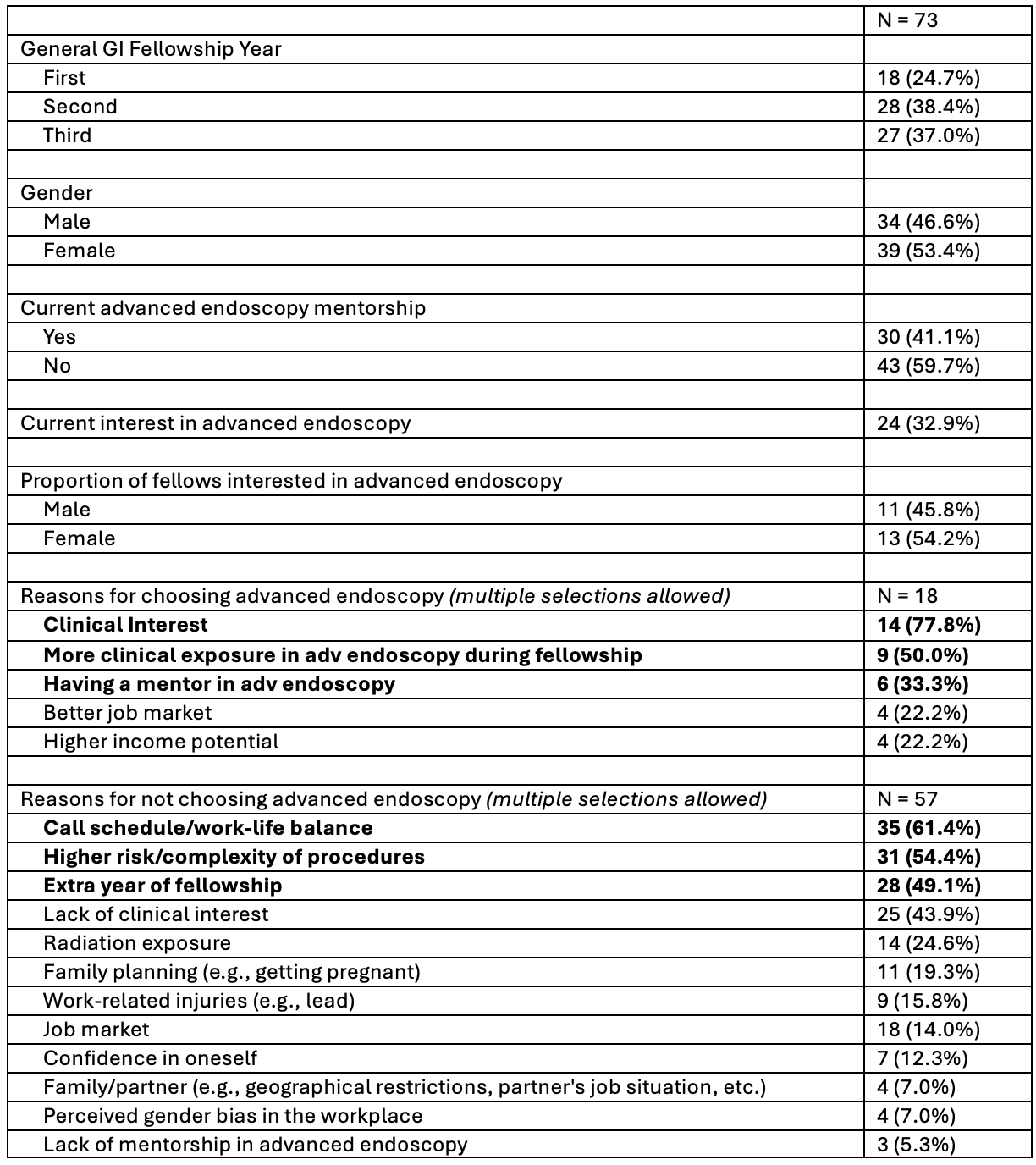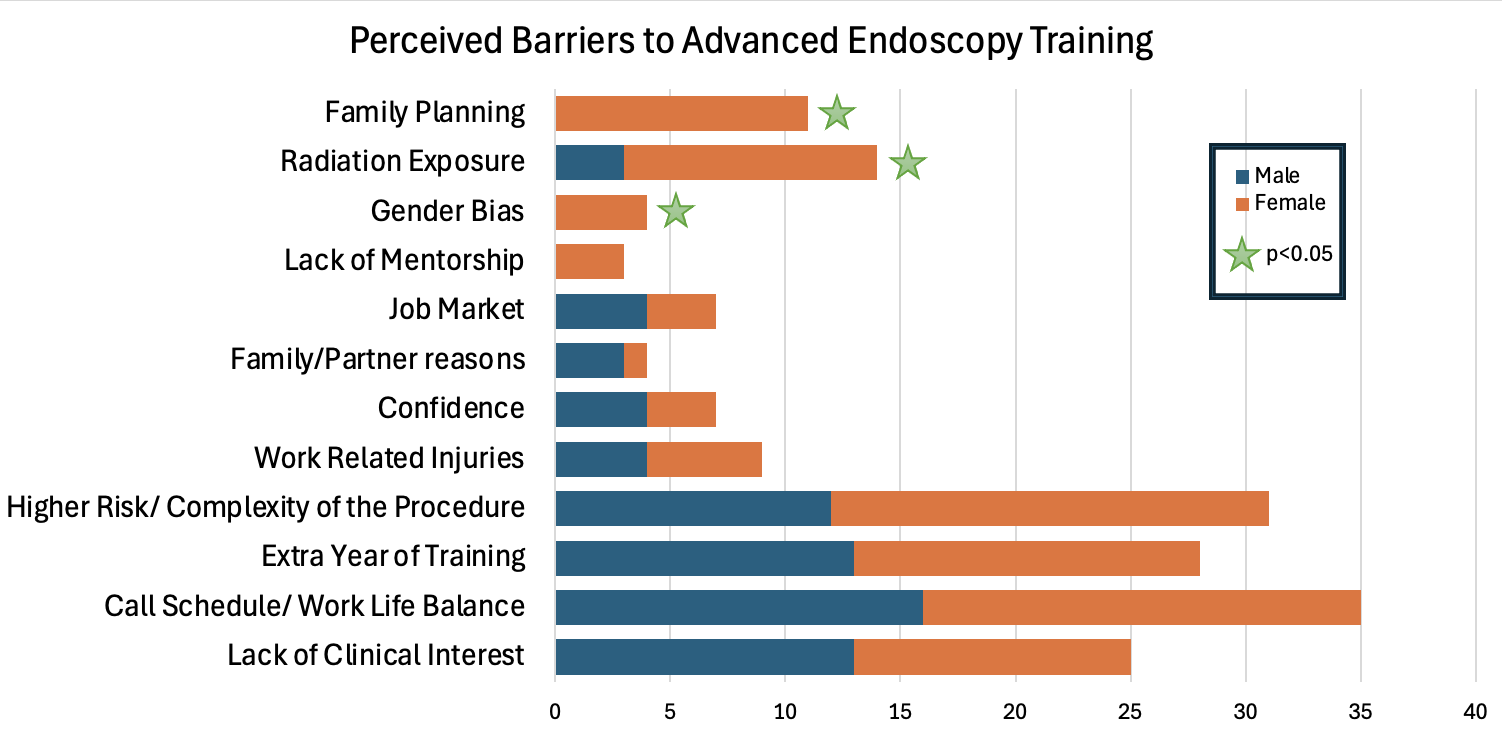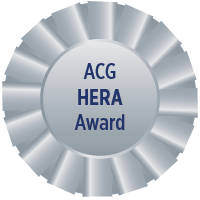Monday Poster Session
Category: Interventional Endoscopy
P3527 - Gender Differences in Perceived Barriers to Advanced Endoscopy Training Among Gastroenterology Fellows
Monday, October 27, 2025
10:30 AM - 4:00 PM PDT
Location: Exhibit Hall
- GK
Grace E. Kim, MD
University of Chicago Medicine
Chicago, IL
Presenting Author(s)
Award: ACG Presidential Poster Award
Grace E. Kim, MD, Rebecca Yao, MD, Eric Montminy, MD, Dennis Chen, MD, Uzma D. Siddiqui, MD, FACG
University of Chicago Medicine, Chicago, IL
Introduction: Women are underrepresented in the field of advanced endoscopy (AE), as evidenced in the 2023 ASGE Advanced Endoscopy Fellowship match with only 16% being female. While previous studies have explored reasons for this low number and barriers to an AE career path, these focused on perspectives of program directors and faculty. There have been no studies to our knowledge that specifically examined fellows’ perceptions about pursuing AE. This study aims to identify factors that deter general gastroenterology (GI) fellows from pursuing a career in AE.
Methods: A 12-question survey (IRB exemption granted) was distributed to current general GI fellows training in the USA. All responses were anonymously recorded. Data analysis was performed using R version 4.4.2 with Pearson’s Chi-Square tests and logistic regression analysis.
Results: 73 fellows (54% female) completed the survey (Table 1). 24/73 fellows (32.9%) expressed an interest in AE, though only 11 of those fellows had applied or planned to apply for AE fellowship. No significant differences were seen within these groups based on gender.
The top reasons fellows identified for choosing AE were clinical interest (77.8%), exposure during fellowship (50%), and having a mentor in AE (33.3%). Fellows not planning to pursue AE most frequently cited call schedule/work-life balance (61.4%), followed by procedure complexity (54.4%), and the extra year of training (49.1%) as deterrents.
Females were significantly more likely than males to identify family planning (p< 0.001), radiation exposure (p=0.033), and gender bias (p=0.049) as deterrents. Notably, no male fellows identified family planning, lack of mentorship, or gender bias as deterrents in pursuing AE (Figure 1). Two respondents answered both questions on reasons for choosing and not choosing AE.
Discussion: This novel study surveyed fellows’ perceptions of AE and identified several factors that were significantly more concerning for females than males when considering a career in AE. Despite equal interest in AE between genders during GI fellowship, there were differences in perceived barriers between the groups. Recognizing these issues and fostering open discussions to enhance the current work environment in AE may help female fellows feel more comfortable exploring this field as a career path. By focusing on the perspectives of GI fellows, this study provides valuable insights that can help identify and address these barriers earlier and promote greater diversity in AE.

Figure: Table 1. Descriptive statistics on the survey.

Figure: Figure 1. Barriers to pursuing advanced endoscopy by gender.
Disclosures:
Grace Kim indicated no relevant financial relationships.
Rebecca Yao indicated no relevant financial relationships.
Eric Montminy indicated no relevant financial relationships.
Dennis Chen indicated no relevant financial relationships.
Uzma Siddiqui: Boston Scientific – Consultant, Grant/Research Support, Speakers Bureau. ConMed – Consultant, Speakers Bureau. Cook – Consultant, Speakers Bureau. Medtronic – Consultant, Speakers Bureau. Olympus – Consultant, Grant/Research Support, Speakers Bureau.
Grace E. Kim, MD, Rebecca Yao, MD, Eric Montminy, MD, Dennis Chen, MD, Uzma D. Siddiqui, MD, FACG. P3527 - Gender Differences in Perceived Barriers to Advanced Endoscopy Training Among Gastroenterology Fellows, ACG 2025 Annual Scientific Meeting Abstracts. Phoenix, AZ: American College of Gastroenterology.
Grace E. Kim, MD, Rebecca Yao, MD, Eric Montminy, MD, Dennis Chen, MD, Uzma D. Siddiqui, MD, FACG
University of Chicago Medicine, Chicago, IL
Introduction: Women are underrepresented in the field of advanced endoscopy (AE), as evidenced in the 2023 ASGE Advanced Endoscopy Fellowship match with only 16% being female. While previous studies have explored reasons for this low number and barriers to an AE career path, these focused on perspectives of program directors and faculty. There have been no studies to our knowledge that specifically examined fellows’ perceptions about pursuing AE. This study aims to identify factors that deter general gastroenterology (GI) fellows from pursuing a career in AE.
Methods: A 12-question survey (IRB exemption granted) was distributed to current general GI fellows training in the USA. All responses were anonymously recorded. Data analysis was performed using R version 4.4.2 with Pearson’s Chi-Square tests and logistic regression analysis.
Results: 73 fellows (54% female) completed the survey (Table 1). 24/73 fellows (32.9%) expressed an interest in AE, though only 11 of those fellows had applied or planned to apply for AE fellowship. No significant differences were seen within these groups based on gender.
The top reasons fellows identified for choosing AE were clinical interest (77.8%), exposure during fellowship (50%), and having a mentor in AE (33.3%). Fellows not planning to pursue AE most frequently cited call schedule/work-life balance (61.4%), followed by procedure complexity (54.4%), and the extra year of training (49.1%) as deterrents.
Females were significantly more likely than males to identify family planning (p< 0.001), radiation exposure (p=0.033), and gender bias (p=0.049) as deterrents. Notably, no male fellows identified family planning, lack of mentorship, or gender bias as deterrents in pursuing AE (Figure 1). Two respondents answered both questions on reasons for choosing and not choosing AE.
Discussion: This novel study surveyed fellows’ perceptions of AE and identified several factors that were significantly more concerning for females than males when considering a career in AE. Despite equal interest in AE between genders during GI fellowship, there were differences in perceived barriers between the groups. Recognizing these issues and fostering open discussions to enhance the current work environment in AE may help female fellows feel more comfortable exploring this field as a career path. By focusing on the perspectives of GI fellows, this study provides valuable insights that can help identify and address these barriers earlier and promote greater diversity in AE.

Figure: Table 1. Descriptive statistics on the survey.

Figure: Figure 1. Barriers to pursuing advanced endoscopy by gender.
Disclosures:
Grace Kim indicated no relevant financial relationships.
Rebecca Yao indicated no relevant financial relationships.
Eric Montminy indicated no relevant financial relationships.
Dennis Chen indicated no relevant financial relationships.
Uzma Siddiqui: Boston Scientific – Consultant, Grant/Research Support, Speakers Bureau. ConMed – Consultant, Speakers Bureau. Cook – Consultant, Speakers Bureau. Medtronic – Consultant, Speakers Bureau. Olympus – Consultant, Grant/Research Support, Speakers Bureau.
Grace E. Kim, MD, Rebecca Yao, MD, Eric Montminy, MD, Dennis Chen, MD, Uzma D. Siddiqui, MD, FACG. P3527 - Gender Differences in Perceived Barriers to Advanced Endoscopy Training Among Gastroenterology Fellows, ACG 2025 Annual Scientific Meeting Abstracts. Phoenix, AZ: American College of Gastroenterology.



